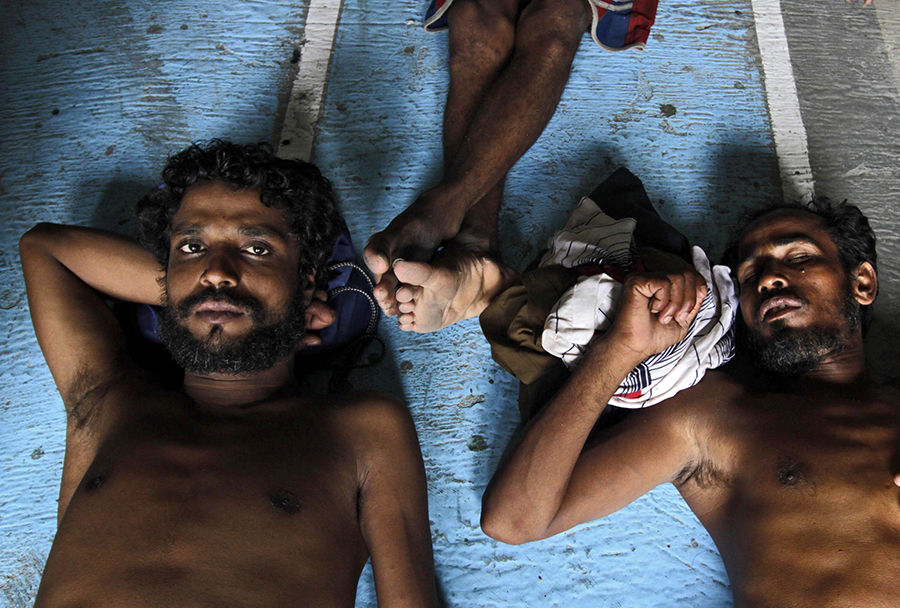On Sunday Pope Francis made a fresh appeal on behalf of the persecuted Muslim Rohingya minority, voicing his closeness to those suffering from recent violence, and asking that members of the ethnic group be given full rights. During his Aug. 27 Sunday Angelus address, the Pope said he is following the “sad news of the religious persecution of our brother and sister Rohingya.” “I would like to express all of my closeness to them,” he said, and asked pilgrims to pray for “the Lord to save them, to arouse men and women of goodwill to help them, who give them full rights.”
The Rohingya are an Indo-Aryan ethnic group largely from the Rakhine state of Burma, in west Myanmar. Since fighing began in 2012 between the state's Buddhist community and the long-oppressed Rohingya Muslim minority, hundreds of thousands of Rohingya have been displaced, while similar numbers have fled Myanmar by sea.
In order to escape forced segregation from the rest of the population inside rural ghettos, many of the Rohingya — who are not recognized by the government as a legitimate ethnic group or as citizens of Myanmar — have made perilous journeys by sea in hope of evading persecution. Just since last year, around 87,000 Rohingya have fled to Bangladesh amid a military crackdown on insurgents in Myanmar's western Rakhine state, giving way to horrifying stories of rapes, killings and arson by security forces.
However, in Bangladesh the Rohingya have had little relief, since they are not recognized as refugees in the country. Since last October, many who had fled to Bangladesh have been detained and forced to return to the neighboring Rakhine state.
The Pope's appeal Sunday comes as the number of new deaths continues to rise amid renewed clashes between the Rohingya and the Myanmar army, which sprung up Friday on the outskirts of the large city of Maungdaw. The spat, which is the worst since last October, has prompted the government to evacuate staff and non-Muslims from the area.
According to the Guardian, nearly 100 have died and thousands have been evacuated as fighting goes into it's third day. The death toll from the renewed spat of violence has climbed to 98, including 80 from among Rohingya insurgents and 12 Myanmar security forces. So far, the government has reportedly evacuated at least 4,000 villagers, with nearly 2,000 Rohingya Muslims, mostly women and children, fleeing across the border to Bangladesh, where they are now living as refugees in makeshift camps along the border.
Pope Francis, who is expected to make a trip to both Myanmar and Bangladesh sometime before Christmas, has spoken out on the behalf of the Rohingya frequently, and their plight — rights included — is likely to be a key talking point during his visit to the Asian nations.
Most recently, in his Feb. 8 general audience, the Pope asked pilgrims to pray with him “for our brother and sister Rohingya. They were driven out of Myanmar, they go from one place to another and no one wants them.” “They are good people, peaceful people; they aren’t Christians, but they are good. They are our brothers and sisters. And they have suffered for years,” he said, and led pilgrims in praying an “Our Father” for the Rohingya.
In his Angelus address Sunday, Pope Francis focused on the Gospel passage from Matthew, in which Peter declares that Jesus is the Messiah, and Jesus in turn tells Peter that “you are Peter, and on this rock I will build my Church.” When Jesus asks his disciples, “who do you say that I am?” he understands from Peter's response that “thanks to the faith given by the Father, there is a solid foundation on which to build his community, his Church.”
Jesus, he said, wishes to continue building his Church today, which is a house “with solid foundations, but where cracks are not lacking, and which needs to be continually repaired, as in the time of St. Francis of Assisi.” We typically don't feel the big rocks, only the small stones, he said, but stressed that “no small stone is useless.” “Rather, in the hands of Jesus it becomes precious, because he picks it up, looks at it with tenderness, works it with his Spirit and puts it in the right place, where he has always thought and where it can be most useful to the whole building.”
Each of us, no matter how small, “have become living stones of his love, and so we have a place and a mission in the Church,” Francis said, explaining that “this is a community of life, made by many stones, all different, which form a single building in a sign of brotherhood and communion.”
Pope Francis then led pilgrims in praying the traditional Angelus prayer, and offered prayers for the victims of recent flooding in Bangladesh, Napal and India.

